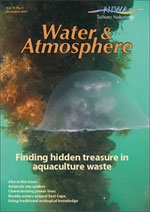PDF of this article (64 KB)

One of NIWA’s aims with this magazine is to contribute to science education in New Zealand. To this end we distribute Water & Atmosphere without charge to New Zealand high schools. Articles are assigned ‘Curriculum Connections’ to indicate which of the NZ NCEA Achievement or Unit Standards they can complement as a classroom resource. These links are assigned by Royal Society of New Zealand Teacher Fellows who are working during the year with NIWA scientists.
The magazine and the Curriculum Connections are also available online at www.niwa.co.nz/pubs/wa/ There you’ll find an archive of back issues beginning with September 2000 (vol. 8, no. 3). All online articles include a pdf of the printed version and the articles are indexed via the website’s search engine. The Curriculum Connections are compiled at www.niwa.co.nz/pubs/wa/resources/
Curriculum connections for this issue
| Pages | Article | Relevant NCEA Achievement Standards (AS) and Unit Standards (US) | Brief summary |
|---|---|---|---|
| 10–11 | Finding hidden treasure in aquaculture waste | Biology Level 2 US6309 Economics Level 1 AS90196 | Integrated co-culture offers a way to increase aquaculture productivity without enlarging its environmental footprint. |
| 12–13 | Putting Antarctic sea spiders in their place | Biology Level 2 US6308, Level 3 AS90718 | New phylogenetic studies of sea spider DNA are uncovering some surprises about the Pycnogonid family tree. |
| 14–15 | Kingdom Chromista in New Zealand | Biology Level 2 US6308 |
From diatoms to giant kelp, the six phyla of chromists fill many slots in New Zealand biodiversity. |
| 16–17 | Biology Level 2 AS90460, Level 3 AS90461 |
Recent research shows that species-rich squat lobsters are an important component of fish diet in New Zealand. |
|
| 18-19 | Biology Level 2 AS90769, US6309 Science Level 3 US21613 |
Through structured interviews, the knowledge of local fishers and shellfish gatherers can help reconstruct the history of our fisheries. |
|
| 20-21 | Biology Level 2 AS90769, AS90461 Geography Level 2 AS90331, US5089, Level 3 AS90701, US5095 |
Geology, climate, agriculture, and housing development all contribute to sediment runoff that is smothering local kaimoana. |
|
| 22–23 | Tracking the Waipaoa out to sea | Geography Level 2 AS90331, US5089, Level 3 AS90701, US5095 Science Level 3 AS9073 | As part of an international research programme, scientists are studying the history of sediment dispersal from source to sink in Poverty Bay and beyond. |
| 24–25 | Social Studies Level 2 AS90274 Electricity Supply US18273, US18275 |
NIWA instruments and modelling are helping to ensure the safe and full use of the high-tension power lines that span the country. |
